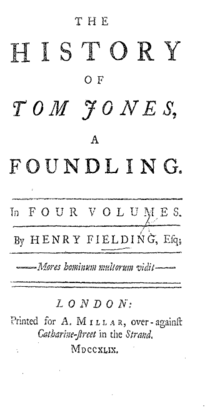Well, thanks to that unexpected nine-week break, I’m abandoning the whole “read through this in 2020” goal. This bothers me a little bit, but I’ll get over it.
So, when we left Tom, he was in London. He’d made some decent friends (or at least allies), was being his usual generous and helpful self with them. He’d also found a way to hopefully gain an audience with Sophia, but it looks like it’s going to take some work. Let’s dive back in, shall we?
Oh, my hardcopy with the funky capitalization, etc. is in a different box than I believed. So, Project Gutenberg to the rescue today.

 I just love the titles of the first two chapters we’re looking at this week: “Which treats of matters of a very different kind from those in the preceding chapter,” and “A chapter which, though short, may draw tears from some eyes.”
I just love the titles of the first two chapters we’re looking at this week: “Which treats of matters of a very different kind from those in the preceding chapter,” and “A chapter which, though short, may draw tears from some eyes.”
So Tom’s getting nowhere with his connections to Sophia—in fact, it’s getting to the point that he’s about to lose his connection if he keeps bringing her up. But, he’s a clever guy. If Lady Bellaston won’t help him who will? Well, what she knows, the servants likely know (he figures), so Partridge is deployed to get that information from the servants.
While we wait for results on that front, we learn that Lady Bellaston is what we would call a cougar (or we would’ve a few years ago, anyway), and she has her sights set on Tom, and showers him with attention (and gifts). Tom isn’t interested in her, he’s devoted to Sophia. But, it’d be rude to not return a little of the affection she’s showering on him.
One night, he’s compelled to ditch his pal Nightengale—they were supposed to go see a play together, but Bellaston wanted Tom to come meet her in her home. To make this appointment possible, Bellaston sends away some servants and even arranges for her houseguest, Sophia, to attend that same play (with a chaperone, of course).
But before Tom can leave, Mrs. Miller asks him to join her to meet someone. The cousin that Tom’s been so recently generous to is downstairs and wants to thank him. Now remember a few chapters back, when someone tried to steal from Tom, tells him a sob story about a sick family member, and so Tom gives him some money? Well, guess who Mrs. Miller’s cousin happens to be. It’s practically a Dickensian coincidence (if Dickens had been born yet, anyway). Mr. Miller had already planned on spilling his heart in gratitude, but this just compounded his thanks. Tom’s gratified to hear how much he’s helped. (this is the chapter we might have got teary about).
So then Tom heads to Ballston’s, and gets there early, so is hanging out in the drawing room to wait. The play turned into some sort of a to-do. it was a new play, and apparently controversial. One group had shown up to protest, another to cheer it on (Nightengale had been counting on Tom to help him encourage the production). It was all too much for Sophia, who came home between accts. She discovers Tom, and almost faints.
To paint the looks or thoughts of either of these lovers, is beyond my power. As their sensations, from their mutual silence, may be judged to have been too big for their own utterance, it cannot be supposed that I should be able to express them: and the misfortune is, that few of my readers have been enough in love to feel by their own hearts what past at this time in theirs.
In what follows, Tom gives her the pocketbook and money, they clear up some misconceptions and misunderstandings, basically clear the air and are getting all sentimental with each other, when Tom remembers he has to ask her to forget about him (the last thing she wants to hear), and starts to say something along those lines, but botches it and says something
that sounded like a proposal of marriage. To which she replied, “That, did not her duty to her father forbid her to follow her own inclinations, ruin with him would be more welcome to her than the most affluent fortune with another man.”
The use of the word “ruin,” brings everything back to Tom and he starts to do what he’s supposed to do, but she interrupts to ask what he was doing in that room. Naturally, in walks Lady Bellaston—shocked to find the two of them together, and she demands to know what Sophia is doing there.
Sophia tells what happened at the play (Bellaston doubts it), says that Tom came to return her pocketbook (Bellaston knew it was missing, doesn’t believe that Tom returned it), after tracking her down by the name inside it. Bellaston and Tom don’t let on that they know each other either. Tom’s willing to play along, as it keeps both women from being upset with him.
Tom leaves, and the two women spend some time lying to each other about what they think about Tom, what they know about him, and so on. It’s a giant mess that’s sure to come toppling down soon.
And there we go, back to the book and at the end of Book Thirteen. Both of which are fun. We’re in the final third here, so things are going to start happening more quickly (I expect). Will Tom come clean to Sophia about Bellaston? Will Bellaston tell Sophia that she knew she was lying about Tom? Is Tom still destined for a hanging? All this and more to come in the next few chapters.
![]()

